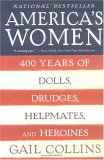Summary | Excerpt | Reviews | Read-Alikes | Genres & Themes | Author Bio

This intellectually vigorous and gripping historical analysis of marriage sheds new light on an institution most people take for granted, and that may, in fact, be experiencing its most convulsive upheaval since the Reformation.
A woman coming of age today has good reason to wonder what marriage will mean to her. Certainly, it will no longer imply that her husband will provide for her, as an ability to earn a living is commonly expected of both men and women. Also, marriage will no longer offer a woman a unique gateway into sexual and domestic pleasures, since premarital cohabitation has long ago ceased to be a taboo. Marriage will not be a woman's indispensable passage to motherhood -- up to 40 percent of American first babies are being born out of wedlock. And, since one in two marriages will end in divorce, it will no longer guarantee a woman permanent protection in a world that has traditionally been unkind to unmarried women.
In this atmosphere of high ambiguity, it is instructive to look to the past, to see what it meant to be a wife from the earliest days of civilization to the present, and to explore how the contemporary wife came into being.
From the perspective of modern marriage, the distinguished cultural historian Marilyn Yalom charts the evolution of marriage in the judeo christian world through the centuries and shows how radical that collective change has been. For example, how did marriage, considered a religious duty in medieval Europe, become a venue for personal fulfillment in contemporary America? How did the notion of romantic love, a novelty in the Middle Ages, become a prerequisite for marriage today? And, if the original purpose of marriage was procreation, what exactly is the purpose of marriage for women now?
A History of the Wife is a study of laws, religious practices, social customs, economic patterns, and political consciousness that have affected generations of wives: in ancient Greece, where daughters were given by fathers to husbands to create legitimate offspring; in medieval Europe, where marriage was infused with religious meaning; during the Reformation and the Age of Enlightenment, when ideals of companionate marriage came to the fore; and in twentieth century America, where a new model of spousal relationships emerged.
This rich, lucid chronicle of the turning points in a History of the Wife includes unforgettable stories about married women who have rebelled against the conventions of their times, from Marjorie Kempe to Elizabeth Cady Stanton, from Heloise to Margaret Sanger. Drawing extensively from diaries, memoirs, and letters, A History of the Wife also pays tribute to the ordinary wives who over the centuries changed with and against the currents they encountered, quietly affecting the legal, personal, and social meaning of marriage.
For any woman who is, has been, or ever will be married, this intellectually vigorous and gripping historical analysis of marriage sheds new light on an institution most people take for granted, and that may, in fact, be experiencing its most convulsive upheaval since the Reformation.
 Diane Johnson, author of Le Divorce and Le Mariage
Marilyn Yalom's brilliant deconstruction of the married state for women is at once reassuring and shocking...it is perfectly fascinating and explains a lot.
Diane Johnson, author of Le Divorce and Le Mariage
Marilyn Yalom's brilliant deconstruction of the married state for women is at once reassuring and shocking...it is perfectly fascinating and explains a lot. Diane Middlebrook, author of Anne Sexton: A Biography
A deft and savvy companion on this fast-forward spin through the centuries...the book has a voice--slightly marveling, often amused, always engaged.
Diane Middlebrook, author of Anne Sexton: A Biography
A deft and savvy companion on this fast-forward spin through the centuries...the book has a voice--slightly marveling, often amused, always engaged.
If you liked The History of The Wife, try these:

by Gail Collins
Published 2004
A landmark work of history telling the story of more than four centuries of history featuring a stunning array of personalities.

by Cheryl Benard
Published 2002
Reveals the remarkable
bravery and spirit of the women of the Revolutionary Association of the Women of
Afghanistan (RAWA), whose daring clandestine activities defied the forces of the
Taliban and earned the world's fierce admiration.
When men are not regretting that life is so short, they are doing something to kill time.
Click Here to find out who said this, as well as discovering other famous literary quotes!